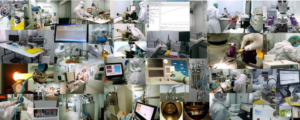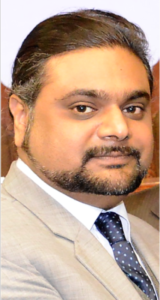 The Islamic Development Bank (IDB) has appreciated the noticeable achievements and progress made by the Centre for Advanced Electronics & Photovoltaic Engineering (CAEPE) at International Islamic University, Islamabad. The centre is pursuing the goal of convergence of energy and nano-scale electronics avenues for economic growth in the country. It has originated as an implementation and outcome of Bank’s funded two back to back international grants.
The Islamic Development Bank (IDB) has appreciated the noticeable achievements and progress made by the Centre for Advanced Electronics & Photovoltaic Engineering (CAEPE) at International Islamic University, Islamabad. The centre is pursuing the goal of convergence of energy and nano-scale electronics avenues for economic growth in the country. It has originated as an implementation and outcome of Bank’s funded two back to back international grants.
CAEPE is a university wide Centre and a user-access facility with Pakistan’s First ISO-5 Cleanroom for device fabrication and over 300 scientific projects from within and outside the university utilizing its unique facilities. Centre’s Indigenous research problems are focused to create knowledge in Micro- and Nano-scale Engineering of Devices, Materials and Systems to enable solutions for Big Problems such as Connectivity, Sensing, Energy, and Improving Quality of Life.
 The Islamic Development Bank, as the funding agency, regularly monitors the progress and achievements of the Centre. The Bank, in a very recent communication with the university Rector, Dr. Masoom Yasinzai and the Government of Pakistan through the Secretary of the Economic Affairs, has termed it as gratifying to see the way this Centre has made significant progress in diverse areas of research, including facility development, teaching, training and supervision, as well as dissemination of knowledge created under the leadership of Prof. Dr. Ahmed Shuja Syed, Executive Director and Principal Investigators of both the grants. The Bank further affirmed its support and wished to see the Centre to act as the Centre of Excellence for the Reverse Linkages program of the Bank so that other Member States may also benefit from the good work carried out by the Centre.
The Islamic Development Bank, as the funding agency, regularly monitors the progress and achievements of the Centre. The Bank, in a very recent communication with the university Rector, Dr. Masoom Yasinzai and the Government of Pakistan through the Secretary of the Economic Affairs, has termed it as gratifying to see the way this Centre has made significant progress in diverse areas of research, including facility development, teaching, training and supervision, as well as dissemination of knowledge created under the leadership of Prof. Dr. Ahmed Shuja Syed, Executive Director and Principal Investigators of both the grants. The Bank further affirmed its support and wished to see the Centre to act as the Centre of Excellence for the Reverse Linkages program of the Bank so that other Member States may also benefit from the good work carried out by the Centre.
Thanking the funding agency and the university authorities for support and encouragement, Prof. Shuja said that R&D was important for the convergence of energy, photonic and nano-scale electronics avenues for economic growth in the country through sustainable sources of research training and development of qualified manpower with a focus on future requirements.”

